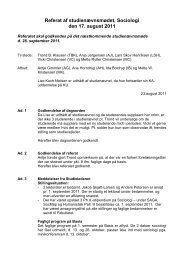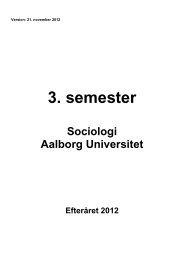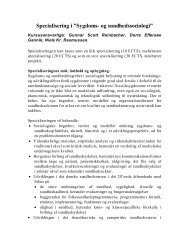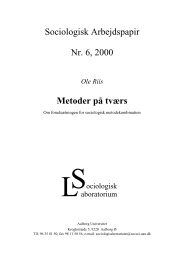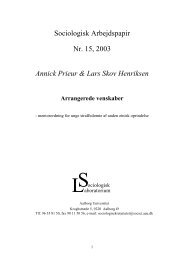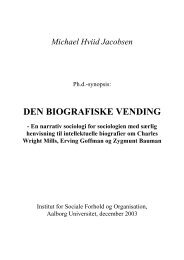Utopianism in the Work of Zygmunt Bauman - Sociologi - Aalborg ...
Utopianism in the Work of Zygmunt Bauman - Sociologi - Aalborg ...
Utopianism in the Work of Zygmunt Bauman - Sociologi - Aalborg ...
Create successful ePaper yourself
Turn your PDF publications into a flip-book with our unique Google optimized e-Paper software.
The Universal Quest for Utopia<br />
A central def<strong>in</strong><strong>in</strong>g characteristic <strong>of</strong> dom<strong>in</strong>ant parts <strong>of</strong> <strong>the</strong> discipl<strong>in</strong>e <strong>of</strong> sociol-<br />
ogy has for decades been its defence <strong>of</strong> objectivity, dis<strong>in</strong>terestedness, value-<br />
neutrality and realism. Despite this, <strong>the</strong> assumption that th<strong>in</strong>gs can <strong>in</strong> fact be<br />
different from what <strong>the</strong>y currently are appears to be a key <strong>in</strong> <strong>the</strong> understand<strong>in</strong>g<br />
and appreciation <strong>of</strong> <strong>the</strong> work <strong>of</strong> <strong>Zygmunt</strong> <strong>Bauman</strong>. One <strong>of</strong> <strong>the</strong> most widely read<br />
contemporary social th<strong>in</strong>kers and <strong>the</strong>orists, Polish-born and British-based<br />
<strong>Bauman</strong> has provided sociology with a new arsenal <strong>of</strong> concepts and analyses<br />
available for social critics deal<strong>in</strong>g especially with <strong>the</strong> postmodern condition or<br />
what he more recently prefers to refer to as ‘liquid modernity’ (<strong>Bauman</strong> 2000a).<br />
Moreover, he has provided one <strong>of</strong> <strong>the</strong> most comprehensive critiques <strong>of</strong> <strong>the</strong> pro-<br />
ject <strong>of</strong> modernity, especially when it was taken to extremes <strong>in</strong> utopian experi-<br />
ments and projects such as <strong>the</strong> Nazi Holocaust or <strong>the</strong> Stal<strong>in</strong>ist gulags. There-<br />
fore, <strong>in</strong> his most recent book he states that “<strong>the</strong> urge to transcend is <strong>the</strong> most<br />
stubbornly present, nearest to universal, and arguably <strong>the</strong> least destructible<br />
attribute <strong>of</strong> human existence. This cannot be said, however, <strong>of</strong> its articulation<br />
<strong>in</strong>to ‘projects’” (<strong>Bauman</strong> 2002a:222-223). In spite <strong>of</strong> his criticism aimed<br />
aga<strong>in</strong>st <strong>the</strong>se utopian attempts <strong>of</strong> modernist plann<strong>in</strong>g and social eng<strong>in</strong>eer<strong>in</strong>g,<br />
his own writ<strong>in</strong>gs also conta<strong>in</strong> clear undercurrents <strong>of</strong> utopian <strong>in</strong>spired th<strong>in</strong>k<strong>in</strong>g.<br />
This utopian tread, as it were, has been present ever s<strong>in</strong>ce <strong>the</strong> early writ<strong>in</strong>gs and<br />
can still be found <strong>in</strong> <strong>the</strong> latest books perhaps even more explicitly than earlier<br />
(Jacobsen 2003a, 2000d). Thus, his work is characterised by ambivalence to-<br />
wards utopias as towards so many o<strong>the</strong>r social phenomena such as freedom,<br />
modernity, postmodernity, community, work, etc.<br />
<strong>Utopianism</strong> has <strong>of</strong>ten been posed as an attempt at escap<strong>in</strong>g <strong>the</strong> real and<br />
concrete conditions unfavourable to <strong>in</strong>dividual or collective visions <strong>of</strong> <strong>the</strong> ideal<br />
or <strong>the</strong> good society. This also holds true <strong>in</strong> <strong>Bauman</strong>’s case where <strong>the</strong> iron-cages<br />
6



